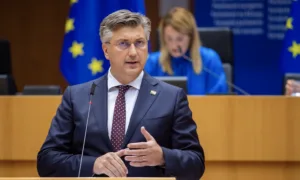Brussels – In the year that could change the political balance in Croatia, the incumbent prime minister for eight years now, Andrej Plenković, is facing increasing domestic political pressure that threatens to challenge his Croatian Democratic Union (HDZ) not in one election round but in three: the European elections in June, the legislative elections in September and the presidential ones in December. After weeks of protests by individual professional groups over dissatisfaction with the Zagreb executive’s policies, it was the centre and leftist parties that catalyzed the desire to “defend democracy”, including through an immediate return to the polls to facilitate the emergence of a non-HDZ-led government 13 years after the last time.

The street protests were attended by tens of thousands of people on Saturday (Feb. 17) in Zagreb, thanks to the initiative of the Social Democratic Party of Croatia (SDP), the environmentalist leftist Možemo and nine other liberal and leftist opposition parties. Triggering the protests in St. Mark’s Square, where the parliamentary seat and prime minister’s office are located, was, in particular, the appointment of Ivan Turudić as attorney general with the green light from Croatian deputies due to his proximity to the HDZ and Plenković’s possible protection from corruption cases should he lose his immunity after the next round of elections. Možemo’s candidate for prime minister in the September elections, Sandra Benčić, has announced that she will report the Croatian government to the European Commission for violating EU Treaties on justice and human rights. The “Turudić issue” has intersected with the simultaneous discontent of several professional groups, which in recent weeks have organized large street demonstrations in Zagreb and other major cities in Croatia: from teachers to judges and doctors over salaries, to journalists opposing the changes to the Criminal Code to criminalise publish leaks.
Opposition forces have submitted a formal request to dissolve the Croatian Parliament and call for an immediate return to the polls but have excluded from the common front right-wing parties such as the Euroskeptic conservatives of Most and the nationalists of the Patriotic Movement (since their criticism of the incumbent government concerns not being tough enough on migration policies, for example). Plenković is an esteemed prime minister at the table of 27 EU leaders, but not without shadow cones also in the area in which he is recognized as one of the most charismatic, the enlargement of the Union to the Western Balkans. He accused “radical left groups” of organizing the demonstrations against his government: “The ones who invited people to St. Mark’s Square are the same who were against the Croatian language law and military aid to Ukraine,” attacked the premier, who is now facing a discontent not seen in years. Amid signs calling for “Enough!” to Plenković and the HDZ, organizers called for a commitment from citizens in the squares and voters at the ballot box to make sure that “they do not lead us into an autocracy” through the curtailment of democratic freedoms in the country.
You can find more insights on the Balkan region in BarBalkans newsletter hosted by Eunews
English version by the Translation Service of Withub



